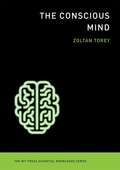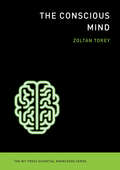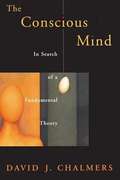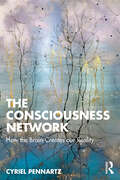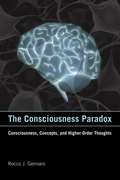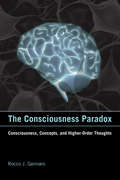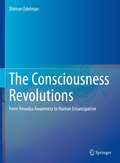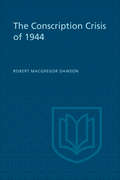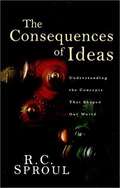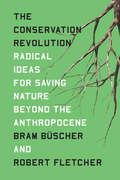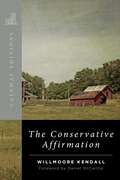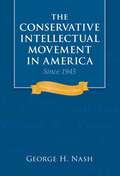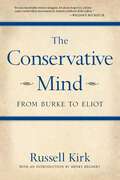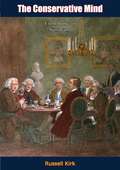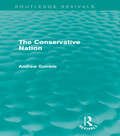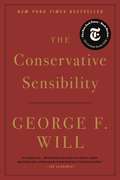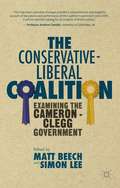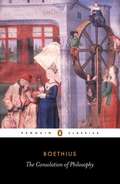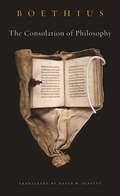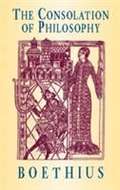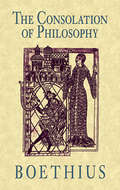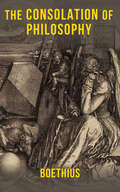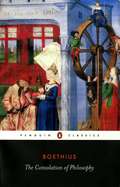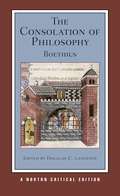- Table View
- List View
The Conscious Mind
by Zoltan ToreyHow did the human mind emerge from the collection of neurons that makes up the brain? How did the brain acquire self-awareness, functional autonomy, language, and the ability to think, to understand itself and the world? In this volume in the Essential Knowledge series, Zoltan Torey offers an accessible and concise description of the evolutionary breakthrough that created the human mind. Drawing on insights from evolutionary biology, neuroscience, and linguistics, Torey reconstructs the sequence of events by which Homo erectus became Homo sapiens. He describes the augmented functioning that underpins the emergent mind -- a new ("off-line") internal response system with which the brain accesses itself and then forms a selection mechanism for mentally generated behavior options. This functional breakthrough, Torey argues, explains how the animal brain's "awareness" became self-accessible and reflective -- that is, how the human brain acquired a conscious mind. Consciousness, unlike animal awareness, is not a unitary phenomenon but a composite process. Torey's account shows how protolanguage evolved into language, how a brain subsystem for the emergent mind was built, and why these developments are opaque to introspection. We experience the brain's functional autonomy, he argues, as free will. Torey proposes that once life began, consciousness had to emerge -- because consciousness is the informational source of the brain's behavioral response. Consciousness, he argues, is not a newly acquired "quality," "cosmic principle," "circuitry arrangement," or "epiphenomenon," as others have argued, but an indispensable working component of the living system's manner of functioning.
The Conscious Mind (The MIT Press Essential Knowledge series)
by Zoltan ToreyAn account of the emergence of the mind: how the brain acquired self-awareness, functional autonomy, the ability to think, and the power of speech.How did the human mind emerge from the collection of neurons that makes up the brain? How did the brain acquire self-awareness, functional autonomy, language, and the ability to think, to understand itself and the world? In this volume in the Essential Knowledge series, Zoltan Torey offers an accessible and concise description of the evolutionary breakthrough that created the human mind.Drawing on insights from evolutionary biology, neuroscience, and linguistics, Torey reconstructs the sequence of events by which Homo erectus became Homo sapiens. He describes the augmented functioning that underpins the emergent mind—a new (“off-line”) internal response system with which the brain accesses itself and then forms a selection mechanism for mentally generated behavior options. This functional breakthrough, Torey argues, explains how the animal brain's “awareness” became self-accessible and reflective—that is, how the human brain acquired a conscious mind. Consciousness, unlike animal awareness, is not a unitary phenomenon but a composite process. Torey's account shows how protolanguage evolved into language, how a brain subsystem for the emergent mind was built, and why these developments are opaque to introspection. We experience the brain's functional autonomy, he argues, as free will.Torey proposes that once life began, consciousness had to emerge—because consciousness is the informational source of the brain's behavioral response. Consciousness, he argues, is not a newly acquired “quality,” “cosmic principle,” “circuitry arrangement,” or “epiphenomenon,” as others have argued, but an indispensable working component of the living system's manner of functioning.
The Conscious Mind: In Search of a Fundamental Theory
by David J. ChalmersThe author provides a philosophical and technical insight into conciousness by trying to find answers to - how does the brain process environmental stimulation, integrate information and why is all this processing accompanied by an experienced inner life?
The Consciousness Network: How the Brain Creates our Reality
by Cyriel PennartzWhat is the relationship between consciousness and our brain? Are they one and the same? Who are we really? The Consciousness Network presents a novel account of one of the greatest scientific challenges of the twenty-first century: understanding the connection between brain and mind.The book explores remarkable cases of patients who demonstrate how our impression of reality is created by the brain. Age-old questions about dreams, colour perception, phantom sensations and hallucinations are illuminated by surprising discoveries from the latest brain research. How does consciousness differ from memory, emotions and behaviour? How did it develop during the evolution of life on earth, and does it serve a purpose? Does the brain leave room for free will? In this unique blend of philosophy, history, psychology and neuroscience, Cyriel Pennartz breaks new ground by presenting an original theory of brain and mind, substantiated by brain research in patients and healthy people. This theory, inspired by the seventeenth-century philosopher Spinoza, goes significantly deeper than current thinking based on computer models or artificial intelligence.The Consciousness Network is essential reading for students working at the interface of neuroscience, cognitive psychology, philosophy of mind and cognitive science, as well as anyone interested in consciousness and the brain.
The Consciousness Paradox
by Rocco J. GennaroConsciousness is arguably the most important area within contemporary philosophy of mind and perhaps the most puzzling aspect of the world. Despite an explosion of research from philosophers, psychologists, and scientists, attempts to explain consciousness in neurophysiological, or even cognitive, terms are often met with great resistance. In The Consciousness Paradox, Rocco Gennaro aims to solve an underlying paradox, namely, how it is possible to hold a number of seemingly inconsistent views, including higher-order thought (HOT) theory, conceptualism, infant and animal consciousness, concept acquisition, and what he calls the HOT-brain thesis. He defends and further develops a metapsychological reductive representational theory of consciousness and applies it to several importantly related problems. Gennaro proposes a version of the HOT theory of consciousness that he calls the "wide intrinsicality view" and shows why it is superior to various alternatives, such as self-representationalism and first-order representationalism. HOT theory says that what makes a mental state conscious is that a suitable higher-order thought is directed at that mental state. Thus Gennaro argues for an overall philosophical theory of consciousness while applying it to other significant issues not usually addressed in the philosophical literature on consciousness. Most cognitive science and empirical works on such topics as concepts and animal consciousness do not address central philosophical theories of consciousness. Gennaro's integration of empirical and philosophical concerns will make his argument of interest to both philosophers and nonphilosophers.
The Consciousness Paradox: Consciousness, Concepts, and Higher-Order Thoughts (Representation and Mind series)
by Rocco J. GennaroA defense of a version of the higher-order thought (HOT) theory of consciousness with special attention to such topics as concepts and animal consciousness. Consciousness is arguably the most important area within contemporary philosophy of mind and perhaps the most puzzling aspect of the world. Despite an explosion of research from philosophers, psychologists, and scientists, attempts to explain consciousness in neurophysiological, or even cognitive, terms are often met with great resistance. In The Consciousness Paradox, Rocco Gennaro aims to solve an underlying paradox, namely, how it is possible to hold a number of seemingly inconsistent views, including higher-order thought (HOT) theory, conceptualism, infant and animal consciousness, concept acquisition, and what he calls the HOT-brain thesis. He defends and further develops a metapsychological reductive representational theory of consciousness and applies it to several importantly related problems. Gennaro proposes a version of the HOT theory of consciousness that he calls the "wide intrinsicality view" and shows why it is superior to various alternatives, such as self-representationalism and first-order representationalism. HOT theory says that what makes a mental state conscious is that a suitable higher-order thought is directed at that mental state.Thus Gennaro argues for an overall philosophical theory of consciousness while applying it to other significant issues not usually addressed in the philosophical literature on consciousness. Most cognitive science and empirical works on such topics as concepts and animal consciousness do not address central philosophical theories of consciousness. Gennaro's integration of empirical and philosophical concerns will make his argument of interest to both philosophers and nonphilosophers.
The Consciousness Revolutions: From Amoeba Awareness to Human Emancipation
by Shimon EdelmanThis book is about all things consciousness, great and small. It starts by pointing to the key characteristic of consciousness, without realizing which it cannot be understood: like everything else about the mind, it is fundamentally a kind of computation. Among many other matters, this explains: how it is that we share some aspects of consciousness with bacteria; how it can arise in artificial machines and not just living ones; how the empty cocoon of the self that it spins ends up pretending to be the butterfly; and how consciousness dooms this virtual butterfly to the splendor and the suffering of being awake and aware. Unlike most other books on consciousness, this one includes a discussion of some possible ways whereby we, pinned like butterflies by our species’ history and socioeconomic circumstances, can awake to our collective predicament and join forces to do something about it. It should be of interest to all readers who care about the nature of our lived experience — and about our survival, which depends on developing critical consciousness of our dire situation and the social dynamics that shape it.
The Conscription Crisis of 1944
by Robert MacGregor DawsonIn the late summer of 1944 the people and Government of Canada had every reason to view with satisfaction the progress of the war and their own part in it. The landing in Normandy had been successful, the enemy was in retreat from Belgium and Holland, Germany itself had been entered. The end of hostilities in Europe seemed in sight, and the Canadian Government in October began to plan for the celebrations to take place on the day victory was announced. Suddenly this atmosphere of imminent success and relaxed tension was broken by the unexpected re-appearance of the ghost of conscription.<P><P> In mid-October Colonel Ralston, the Minister of National Defence, returned abruptly from an inspection trip overseas to report to Prime Minister King that infantry reinforcements for the units fighting in Italy and Northwest Europe were an acute problem and that there seemed no hope of increasing them to the required numbers in the required time. Many, from the Minister himself down, felt that the manpower pools could only be filled by immediate conscription from overseas service of men already called up for home defence under the National Resources Mobilization Act. The Government of Canada was thus confronted with a crisis of the first magnitude, which brought with it the threat of a schism that would cripple the war effort and set people against people, province against province for many years to come.<P> This book provides an engrossing account of how between mid-October and mid-November this crisis was faced and resolved. Professor Dawson is keenly aware of the drama in the clash of personalities, of political views, of beliefs and conducts the eagerly following reader day by day through absorbing events and discussions to the morning of November 22 when Prime Minister King decided on the Order-in-Council drafting 16,000 men. The moment of solution was a historic one: conscription had been put forward by the majority in such a fashion that the minority could accept it, if not with enthusiasm, at least with substantial goodwill. The contrast with 1917 was inescapable.<P> Professor Dawson has given a brilliant essays on the relation of political decision to popular consent in a democracy and it will attract and hold the attention of everyone interested in the arts of government.
The Consequences of Ideas: Understanding the Concepts that Shaped our World
by R. C. Sproul Good News PublishersIf you think philosophy is irrelevant to your daily life, think again. You need only observe the world around you to discover how substantially the ideas of history's thinkers affect us still. You can hear it in the beliefs of your non-Christian friends. In the media, your music, your children's classrooms. You can see it in our public policies, on every bookstore shelf, in the way we understand our very existence--even in the church. We like to believe that we create our little worlds from scratch and then live in them. But the reality is, we step into an environment that already exists, and we learn to interact with it. The game has been conceived long before us; the rules and boundaries already decided. We may be amused when Rene Descartes labors so long in order to conclude that he exists, or puzzled by Immanuel Kant spending his life analyzing how we know anything. Yet these men were not simply contemplating minutiae. The foundational thinking of philosophy tries to lay bare all of our assumptions, revealing our false and sometimes dangerous beliefs so that we may arrive at a coherent worldview. The greater our familiarity with the ideas that have shaped our culture over the centuries, the greater our ability to understand--and influence--that culture for Christ. From ancient Greek thinkers like Plato and Aristotle to Christian philosophers like Augustine and Aquinas to the molders of modern thought such as Kant and Nietszche, R. C. Sproul traces the contours of Western philosophy throughout history and demonstrates the massive consequences these ideas have had on world events, theology, the arts, and culture--as well as in our everyday lives.
The Conservation Revolution: Radical Ideas for Saving Nature Beyond the Anthropocene
by Robert Fletcher Bram BuscherA post-capitalist manifesto for conservationConservation needs a revolution. This is the only way it can contribute to the drastic transformations needed to come to a truly sustainable model of development. The good news is that conservation is ready for revolution. Heated debates about the rise of the Anthropocene and the current &‘sixth extinction&’ crisis demonstrate an urgent need and desire to move beyond mainstream approaches. Yet the conservation community is deeply divided over where to go from here. Some want to place &‘half earth&’ into protected areas. Others want to move away from parks to focus on unexpected and &‘new&’ natures. Many believe conservation requires full integration into capitalist production processes. Building a razor-sharp critique of current conservation proposals and their contradictions, Büscher and Fletcher argue that the Anthropocene challenge demands something bigger, better and bolder. Something truly revolutionary. They propose convivial conservation as the way forward. This approach goes beyond protected areas and faith in markets to incorporate the needs of humans and nonhumans within integrated and just landscapes. Theoretically astute and practically relevant, The Conservation Revolution offers a manifesto for conservation in the twenty-first century—a clarion call that cannot be ignored.
The Conservative Affirmation
by Willmoore KendallMaverick political scientist Willmoore Kendall predicted the triumph of conservatism. Upon the 1963 publication of Kendall's The Conservative Affirmation, his former Yale student William F. Buckley, Jr. called him "one of the most superb and original political analysts of the 20th century," but even Buckley shook his head at what appeared to be Kendall's "baffling optimism." During the 60's, Kendall stood apart from the mainstream conservative movement which he accused of being anti-populist and of "storming American public opinion from without" by wrongly assuming that the American people were essentially corrupt and "always ready to sell their votes to the highest bidder." Kendall believed that Americans would come to actively realize the conservatism which they had always actually lived.
The Conservative Intellectual Movement in America Since 1945
by George H. NashFirst published in 1976, George H. Nash&’s celebrated history of the postwar conservative intellectual movement has become the unquestioned standard in the field. This new edition, published in commemoration of the book's thirtieth anniversary, includes a new preface and conclusion by the author and will continue to instruct anyone interested in how today&’s conservative movement was born.
The Conservative Mind: From Burke to Eliot (Seventh Revised Edition)
by Russell KirkRussell Kirk's The Conservative Mind is one of the greatest contributions to twentieth-century American conservatism. Brilliant in every respect, from its conception to its choice of significant figures representing the history of intellectual conservatism, The Conservative Mind launched the modern American Conservative Movement when it was first published in 1953 and has become an enduring classic of political thought. The seventh revised edition features the complete text and an introduction by publisher Henry Regnery.
The Conservative Mind: From Burke to Santayana
by Russell Kirk"It is inconceivable even to imagine, let alone hope for, a dominant conservative movement in America without Kirk's labor." — William F. Buckley, Jr.Russell Kirk's The Conservative Mind is one of the greatest contributions to twentieth-century American conservatism. Brilliant in every respect, from its conception to its choice of significant figures representing the history of intellectual conservatism, The Conservative Mind launched the modern American Conservative Movement when it was first published in 1953 and has become an enduring classic of political thought.—Print ed.
The Conservative Nation (Routledge Revivals)
by Andrew GambleSince the 1880s, the Conservative Party has been an important political force in Britain. In this study of Conservative ideology since the end of Second World War, first published in 1974, Andrew Gamble considers the nature of Conservative party opinion, and the factors that have accounted for its success. The adaptation of the party post-1945 is discussed, as well as the ascendancy of the Right progressives in the leadership, and the challenge of the Whigs and Imperialists. Finally, the book includes a discussion of the fluctuations within the Conservative Government between 1970 and 1974, with an account of what Gamble believes to have been ultimately a failure. A rigorous and comprehensive analysis of Conservative thought and policy, this study will be of particular value to those with an interest in the history of British Conservative politics and government.
The Conservative Sensibility
by George F. Will<P><P> For more than four decades, George F. Will has attempted to discern the principles of the Western political tradition and apply them to America's civic life. Today, the stakes could hardly be higher. Vital questions about the nature of man, of rights, of equality, of majority rule are bubbling just beneath the surface of daily events in America. <P><P>The Founders' vision, articulated first in the Declaration of Independence and carried out in the Constitution, gave the new republic a framework for government unique in world history. Their beliefs in natural rights, limited government, religious freedom, and in human virtue and dignity ushered in two centuries of American prosperity. <P><P>Now, as Will shows, conservatism is under threat--both from progressives and elements inside the Republican Party. America has become an administrative state, while destructive trends have overtaken family life and higher education. Semi-autonomous executive agencies wield essentially unaccountable power. Congress has failed in its duty to exercise its legislative powers. And the executive branch has slipped the Constitution's leash. <P><P>In the intellectual battle between the vision of Founding Fathers like James Madison, who advanced the notion of natural rights that pre-exist government, and the progressivism advanced by Woodrow Wilson, the Founders have been losing. It's time to reverse America's political fortunes. <P><P>Expansive, intellectually thrilling, and written with the erudite wit that has made Will beloved by millions of readers, The Conservative Sensibility is an extraordinary new book from one of America's most celebrated political writers. <P><b>A New York Times Bestseller</b>
The Conservative–Liberal Coalition
by Simon Lee Matt BeechA unique full term analysis of the Clegg Cameron Government, this new collection from Beech and Lee provides a timely and thought provoking study of the Coalition Government's policies and legislation and its impact on British Politics in light of the next General Election. The Conservative-Liberal Coalition examines the evolution of political thought in both parties, and the impact and ramifications of the Coalition for contemporary conservatism and liberalism. Bringing together a cast of leading academics and political commentators on a range of key issues from the economy and education to immigration and the European Union, this volume explains the nature and development of the Coalition's ideas and policies, and offers a critical evaluation of its strategyfor reducing the United Kingdom's budget deficit. Enabling general readers and voters to decide for themselves on the record of the first coalition government since 1945, this volume is an indispensable guide to the key debates which will shape the conduct of the 2015 general election.
The Consolation of Philosophy
by Ancius BoethiusBoethius was an eminent public figure under the Gothic emperor Theodoric, and an exceptional Greek scholar. When he became involved in a conspiracy and was imprisoned in Pavia, it was to the Greek philosophers that he turned. THE CONSOLATION was written in the period leading up to his brutal execution. It is a dialogue of alternating prose and verse between the ailing prisoner and his 'nurse' Philosophy. Her instruction on the nature of fortune and happiness, good and evil, fate and free will, restore his health and bring him to enlightenment. THE CONSOLATION was extremely popular throughout medieval Europe and his ideas were influential on the thought of Chaucer and Dante.
The Consolation of Philosophy
by Anicius Manlius BoethiusIn this highly praised new translation of Boethius’s The Consolation of Philosophy, David R. Slavitt presents a graceful, accessible, and modern version for both longtime admirers of one of the great masterpieces of philosophical literature and those encountering it for the first time. Slavitt preserves the distinction between the alternating verse and prose sections in the Latin original, allowing us to appreciate the Menippian parallels between the discourses of literary and logical inquiry. His prose translations are lively and colloquial, conveying the argumentative, occasionally bantering tone of the original, while his verse translations restore the beauty and power of Boethius’s poetry. The result is a major contribution to the art of translation.Those less familiar with Consolation may remember it was written under a death sentence. Boethius (c. 480–524), an Imperial official under Theodoric, Ostrogoth ruler of Rome, found himself, in a time of political paranoia, denounced, arrested, and then executed two years later without a trial. Composed while its author was imprisoned, cut off from family and friends, it remains one of Western literature’s most eloquent meditations on the transitory nature of earthly belongings, and the superiority of things of the mind. In an artful combination of verse and prose, Slavitt captures the energy and passion of the original. And in an introduction intended for the general reader, Seth Lerer places Boethius’s life and achievement in context.
The Consolation of Philosophy
by Anicius Manlius Scverinus BoethiusIn this highly praised new translation of Boethius’s The Consolation of Philosophy, David R. Slavitt presents a graceful, accessible, and modern version for both longtime admirers of one of the great masterpieces of philosophical literature and those encountering it for the first time. Slavitt preserves the distinction between the alternating verse and prose sections in the Latin original, allowing us to appreciate the Menippian parallels between the discourses of literary and logical inquiry. His prose translations are lively and colloquial, conveying the argumentative, occasionally bantering tone of the original, while his verse translations restore the beauty and power of Boethius’s poetry. The result is a major contribution to the art of translation. <p><p> Those less familiar with Consolation may remember it was written under a death sentence. Boethius (c. 480–524), an Imperial official under Theodoric, Ostrogoth ruler of Rome, found himself, in a time of political paranoia, denounced, arrested, and then executed two years later without a trial. Composed while its author was imprisoned, cut off from family and friends, it remains one of Western literature’s most eloquent meditations on the transitory nature of earthly belongings, and the superiority of things of the mind. In an artful combination of verse and prose, Slavitt captures the energy and passion of the original. And in an introduction intended for the general reader, Seth Lerer places Boethius’s life and achievement in context.
The Consolation of Philosophy
by Boethius Richard H. GreenOne of the most popular books in Western Europe from the time it appeared in Latin in 524 until the end of the Renaissance, its subject is achieving happiness amidst suffering. Boethius wrote his work of poetry, prose, and personification while imprisoned for treasonable offenses for which he was eventually executed by edict of the Senate he once served. The book opens with a poem whose first line is "I who once wrote songs with keen delight am now by sorrow driven to take up melancholy measures." Boethius continues with the prescriptions to follow nature, and ends by contemplating the eternal.
The Consolation of Philosophy
by BoethiusOne of the most influential books in the history of Western thought, The Consolation of Philosophy was written in a prison cell by a condemned man. Anicius Manlius Severinus Boethius (c. 480–524) was a Roman scholar, theologian, philosopher, and statesman. Imprisoned by the Ostrogothic king Theodoric, probably on trumped-up subversion charges, he was thrown into a remote prison where he was eventually executed.While awaiting his fate, he wrote this dialogue in alternating prose and poetry between himself and his spiritual guardian. Its subject is human happiness and the possibility of achieving it in the midst of the suffering and disappointment that characterize human existence. As Richard H. Green notes in the introduction, "For the reader of the Christian Middle Ages, The Consolation of Philosophy celebrated the life of the mind, or reason, and the possibility of its ultimate victory over the misfortunes and frustrations which attend fallen man's pursuit of transitory substitutes for the Supreme Good which alone can satisfy human desires."Mr. Green's translation is quite literal in order to remain as faithful as possible to Boethius's original meaning. He has also provided an informative introduction and notes. The result is a superbly accessible edition that still exercises a powerful influence on contemporary thinkers and theologians and represents a source of comfort and solace for the general reader.
The Consolation of Philosophy
by BoethiusOften described as the last great work of Western classical antiquity, Boethius' Consolation of Philosophy grapples with many of the enduring questions in philosophy; the problem of evil, determinism vs. free-will and nature of virtue and justice, among others. Though a committed Christian, Boethius arrives at his conclusions by means of the natural philosophical methods of Classical Greece alone, being of the opinion that faith and reason must necessarily arrive at the same conclusions.
The Consolation of Philosophy, Revised Edition
by Anicius Boethius Victor WattsAnicius Boethius (c. AD 480-524) was a Roman philosopher, and was one of the most influential Latin authors for the next thousand years. He became involved in a conspiracy and was imprisoned in Pavia. The Consolation was written in the period leading up to his brutal execution. It is a dialogue of alternating prose and verse between the ailing prisoner and his 'nurse' Philosophy. The Consolation was extremely popular throughout medieval Europe and his ideas were influential on the thought of Chaucer and Dante.
The Consolation of Philosophy: Authoritative Text, Contexts, Criticism
by Boethius Douglas C. LangstonThe Consolation of Philosophy occupies a central place in the history of Western thought. Its author, Anicius Manlius Severinus Boethius (ca. 476-526 c. e. ), was a Roman philosopher, scholar, and statesman who wrote The Consolation of Philosophy while in a remote prison awaiting his execution on dubious political charges. The text of this Norton Critical Edition is based on the translation by Richard H. Green. It is accompanied by the editor's preface and full-scale introduction to the work, the translator's preface, and explanatory annotations. Contexts reprints selections from the texts that Boethius drew upon for his own work. These include excerpts from two of Plato's Dialogues (Gorgias and Timaeus), from Aristotle's Nicomachean Ethics, and from Augustine's On Free Choice of the Will. Criticism collects five wide-ranging essays by major scholars of Boethius. Henry Chadwick presents a general introduction to Boethius's life and works. Nelson Pike presents a clear and insightful interpretation of what Boethius means by writing that God is eternal (timeless). The final three essays-by William Bark, Edmund Reiss, and John Marenbon-all depart from traditional readings of The Consolation of Philosophy in significant ways and are sure to stimulate classroom discussion. A Chronology of Boethius's life and work and a Selected Bibliography are also included.
